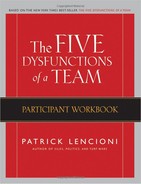Preface
Teamwork remains the one sustainable competitive advantage that has been largely untapped.
Teamwork should be better by now.
With so many books and articles having been written about it, and so many experts having talked about it for so long, teamwork should not be as rare as it is in today's organizations. But that is the reality. Most of the organizations where we live and work are marked by underperforming, often dysfunctional teams.
Why? First, the term teamwork has been overused and lost much of its meaning, like so many other buzzwords in the corporate world. That's why I like to say that teamwork is not a virtue. It's not motherhood and apple pie. Rather, it's a strategic choice. It's a purposeful decision that organizations make.
Second, people overcomplicate teamwork. The fact is, teamwork is simple—in theory, anyway. Most of us already know what it requires. But in practice, teamwork is difficult. That's because human beings are messy, fallible creatures, and when you put enough of us in a room and ask us to work together, problems arise.
To overcome those problems, teams must be willing to invest significant time, energy, and discipline. For those teams willing to do what it requires, the rewards are great.
Functional teams make higher-quality decisions and accomplish more in less time, with less distraction and frustration. Furthermore, they avoid wasting time talking about the wrong issues and revisiting the same topics over and over again because of lack of buy-in.
I hope this workshop will change the way you look at teamwork, and give you the insights necessary to contribute to becoming a more cohesive, functioning team.
Best of luck to you and your team.
Pat Lencioni
